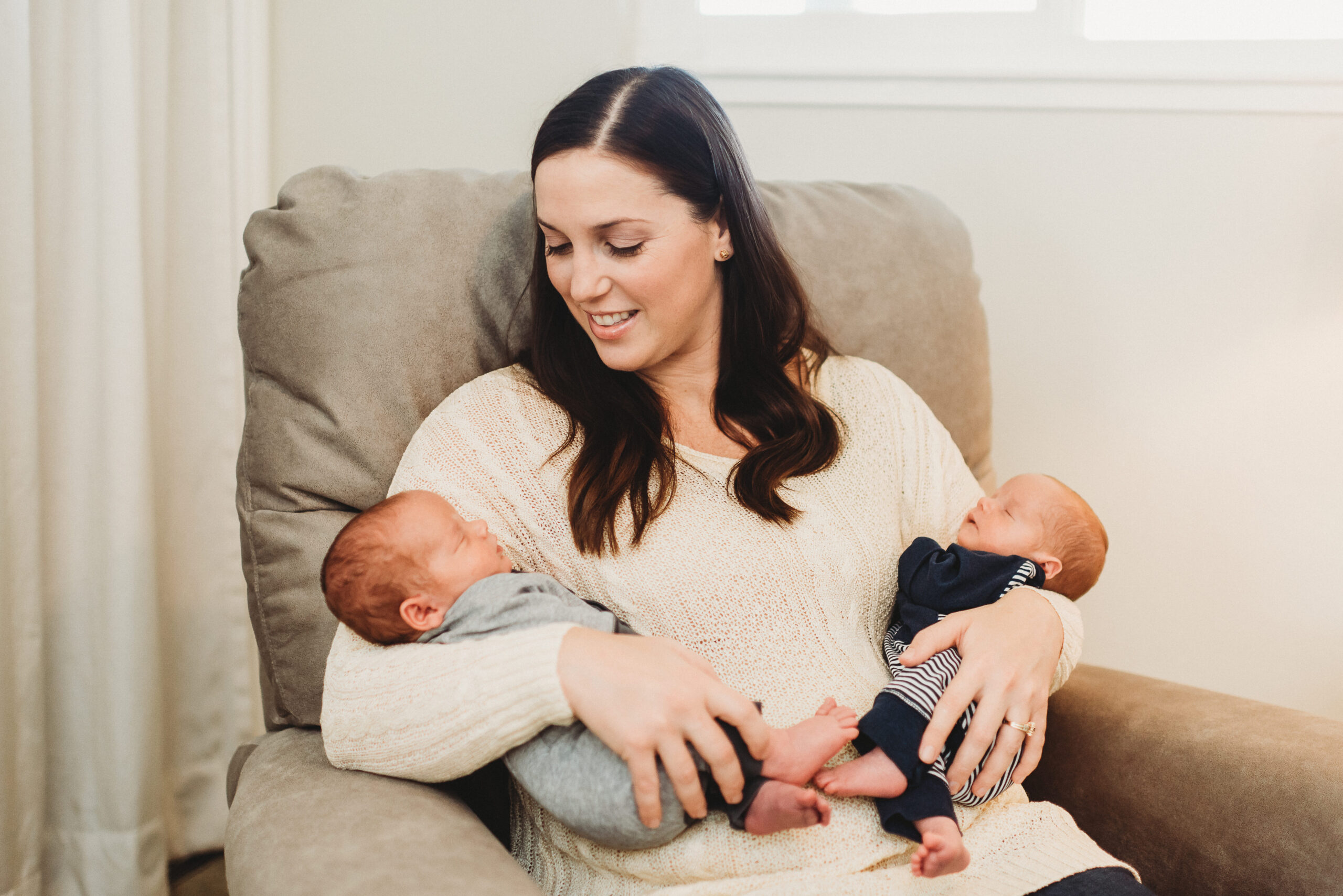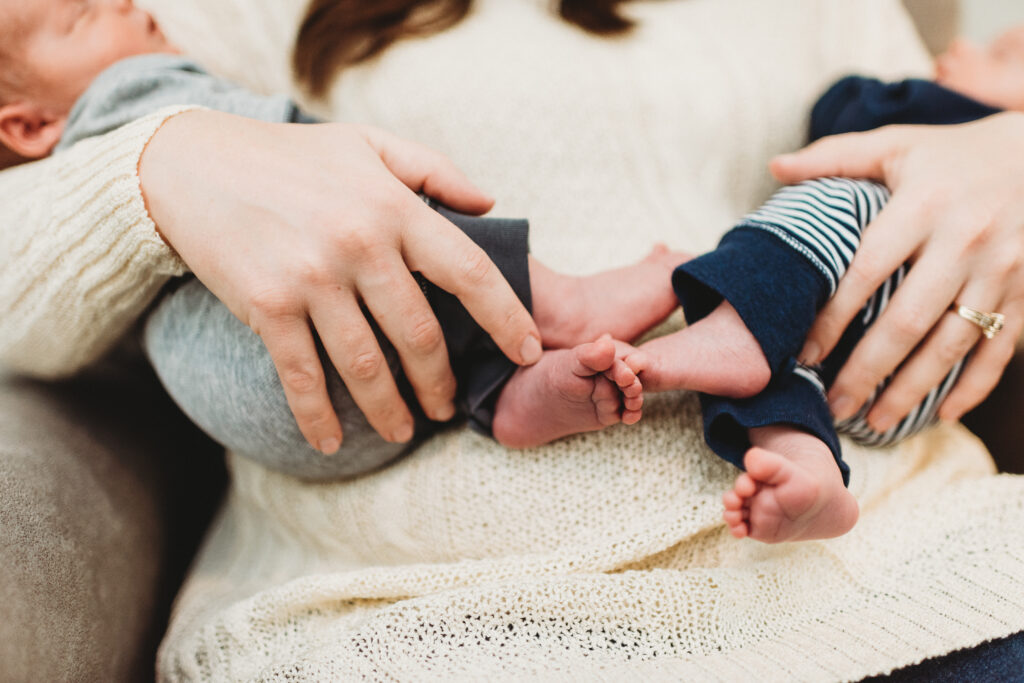
2020 has been a year for the books. It has rocked our world in every way and while it feels like it has been 5 years since January, it’s only September. Many are suffering from postpartum depression (or depression in general) and in the absence of friends and family, too many are doing it alone. I talk a lot about personal growth but before we can build, we need to make sure our foundation is solid.
When I had my twin boys, what was supposed to be one of the happiest times of my life was met with 2 D&C surgeries, worry as I watched one of my perfect baby boys struggle with severe internal reflux and a significant global developmental delay, and the exhaustion of raising twin boys. Even with a strong support system, the weight of it all felt overwhelming. I wanted to hide and wait for the storm to pass.
I started to compare myself to other moms and wondered if my feelings were normal. If they were able to handle being a new mom then I must be able to as well. Being the fixer I am, I tried everything I could think of to pull me out of the depths. I worked out (once doctor approved), ate healthy, cleaned up around the house, and snuggled up with my beautiful baby boys. I didn’t understand why my regular go-to mental pickups were not working.
Being a positive person, it ached when I struggled to find happiness. It was then that I knew I needed to get help. After meeting with my doctor, she confirmed what I knew deep down, I was suffering from postpartum depression. With those 2 words came clarity. It all made sense. Why it was difficult to bond with my boys right away. Why I was full of chest crushing anxiety. Why I felt like an outsider viewing my own life. It was worse than being sad, I felt numb on the inside. Those 2 words allowed me to finally accept the help I needed and begin to heal.
I share my story to bring awareness and a voice to depression. I encourage you to contact your doctor if you are experiencing symptoms of baby blues or postpartum depression as described by the Mayo Clinic. There are many resources available and below are a few that I found helpful to lift the cloud of postpartum depression.
START WITH POSITIVE ACTIONS
When you start feeling down, overwhelmed, and/or filled with anxiety, taking small steps in a positive direction can help change your mindset. Whether it’s working out, eating healthy, taking a walk outside, meditation, or napping if you aren’t getting enough sleep (gotta love those newborns!), these simple actions can make a big impact. Begin with one or two and build from there. Taking on too much change at one time can be exhausting and can have an adverse reaction. For many, these actions are enough to help improve your mood and reduce the feelings of anxiety and depression. As I mentioned above, if not, it’s time to seek additional help.
FIND YOUR SUPPORT GROUP
When I first realized I was suffering from something more than “baby blues” my doctor recommended I attend a postpartum depression group. This group was made up of women who were in many different stages of their postpartum journey. Some, like me, were there for the first time. Others were months past having their children, doing well, and giving us all hope that things would get better. It was a safe space to let your guard down, share your fears, and feel support when it was needed the most.
I remember going to these meetings alone at first. I was scared to take my twins out by myself with no help. This group gave me confidence and soon I was bringing my boys to the meetings with me. I will forever be grateful that this group accepted me with open arms and lifted me up. What I loved about the support group was that in addition to supportive women, a trained counselor joined the meeting to facilitate discussion and help guide our actions. We all chose a weekly affirmation (for example, “I am doing the best I can”) and an action (for example, “I will work out” or “I will ask for help”). This gave us simple actions to begin the process of self-acceptance and change.
Slowly, as small actions compounded, I started to feel stronger, gained confidence, and positivity began to creep in. Whether you are joining an official support group or surrounded by friends and family, my advice is to make sure that you can be completely honest with those around you. You need to be able to share and be heard. You need unconditional support so that you can begin to heal.
THERAPY IS THERAPEUTIC
Therapy is another great resource for support. After attending the postpartum support group for a few months, I felt stronger and wanted a more private setting to continue my healing and growth. When you are going through a difficult time, your thoughts can be clouded and the simplest of tasks can seem daunting. A professional can help you reflect on areas of pain or confusion and help you work through those feelings to gain a better understanding and ability to cope.
There are many types of therapy but one form I found helpful was cognitive behavioral therapy (CBT). As Wikipedia states “CBT focuses on challenging and changing unhelpful cognitive distortions (e.g. thoughts, beliefs, and attitudes) and behaviors, improving emotional regulation, and the development of personal coping strategies that target solving current problems”. I learned about the cognitive model and was provided a thought worksheet. Going through this exercise allowed me to better understand how my interpretation and reaction to situations directly affected my overall state of mind.
We are in control of how we choose to react to each situation. While I used this approach to address my postpartum depression, this can be used in any situation that causes you to react in a negative way. Before doubling down on negative thoughts, remember, you are in control of your thoughts, feelings, and overall behavior. While you might not be able to avoid a difficult situation, you can change how you react to it.
A suggested reading was the book “You can heal your life” by Louise Hay. This book dives into how our lives are a direct response to our thoughts and beliefs. It’s a great read for anyone needing to gain confidence and learn self-love. I learned a lot during my sessions and while I no longer attend regularly, I continue to pull from the skills I learned.
Getting support helped me get through a difficult time in my life. Depression is a topic that should be openly discussed and professional help is an incredible tool to help people navigate the unknown. Do not feel ashamed or less-then because you are in need of additional support. My hope is that by sharing my struggle with postpartum depression and positive outcome, that someone will find the strength to ask for help, begin to heal, and start their own journey of growth.

Karen, you provide insight to so many women and are willing to talk openly about a subject that scares people. Taking away some of the fear and providing a path to take is a great service to many women and a powerful message. Thank you!
I do hope it encourages others. We all need support and help especially during difficult times in our life.
Your honesty and self realization will go far in giving others the courage to recognize and hopefully take whatever beginning steps they can take toward the process of addressing and improving their situation. God grant you continued insight and clarity as you generously reach out to others and share your journey.
Thank you. I’m going to keep on sharing and hope that it will encourages others to take those first steps!
I had PPD with each of my three pregnancies/deliveries. It was awful. I can relate to so much of what you wrote. Thank you for sharing your story and your ways of coping. Excellent post!
I’m so sorry you had to go through that – and 3 times! You are one strong mama. Thank you for reading! I hope that by sharing our stories moms will feel less alone and be encouraged to get the help they need.